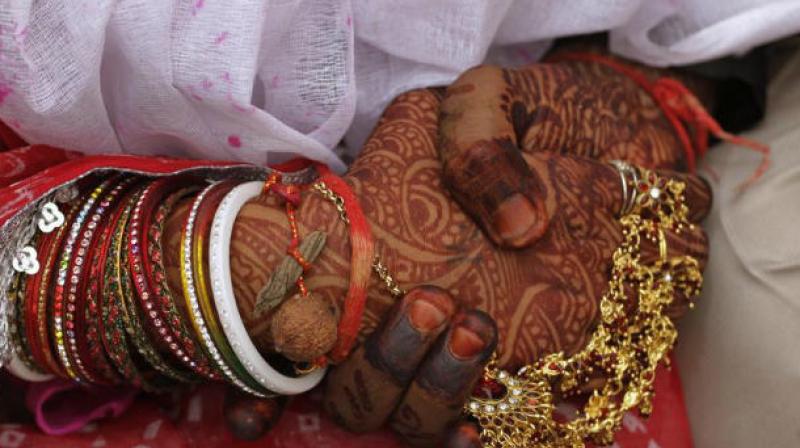Dowry forces women to talaq
Men try to avoid mehar, demand e-dowry'.;

Hyderabad: A majority of the divorces amongst Muslims are now being initiated by women, and the primary reason for this is demand for dowry, according to Shaheen Women’s Resource and Welfare Association.
This is all the more shocking, since in Islam, the concept of giving anything to the newlyweds is vastly different than what is practiced in the Subcontinent.
The malaise has become widespread, to the extent that it has driven women to depression and suicide, say activists.
“There is no concept of dowry in Islam; in fact it mandates ‘mehar’ which is the right of a woman from her husband, as a form of security,” says senior advocate Afsar Jahan.
However, she says that in her legal experience, it is seldom that the mehar is paid during or before the wedding. “In fact, the bride is asked to forego the mehar in the name of piety,” Ms Afsar Jahan says.
Incidentally, mehar need not be in the form of currency. It can even be a pious deed, or a pilgrimage.
“Mehar is the right of a Muslim woman given to her by Allah. No one, even own her father, has the right to ask her to forego mehar. Mehar not only ensure security for the bride, it also is a means for her to refuse an alliance,” says Maulana Afzal Ali Shah, principal, Madrasa-e-Barkatiya.
He elaborated, “If a woman is being forced to marry a person she does not want to, she is at liberty to demand such a high mehar amount that the groom cannot has no option but to call off the wedding. Unfortunately, it is now the groom and his family which is demanding dowry.” Dowry being a rampant practice in India has penetrated across all religions. “Nowadays, it’s taken the shape of electronic dowry, by means of TV, clothes, vehicle etc. Though they demand and are given expensive gadgets, the grooms claim that that they didn’t ask for any dowry,” says Sultana Begum, a counselor. Demanding dowry is criminal offence under Section 498 of Indian Penal Code.
The forced forgoing of meher and dowry demand is making obtaining divorce more difficult for women. “If men initiate the divorce, they cannot force their wives to forego the mehar. Besides they would have to return the dowry. So some of them find it easier is to abandon their wives and marry again,” says K. Devaki, a counselor.
She added, “Eight out of 10 pleas for divorce are initiated by women from our experience. It’s not that women want to end the marriage, but harassment and torture drives them to do so.”
In a recent dowry harassment case lodged with the Bhavaninagar police, the victim, who was married for seven years and had a six-year-old-child was tortured. This forced her to start working.
Her husband then got married for a second time. “She was fed up with the harassment and wanted to apply for divorce,” said Jameela Nishat, who heads Shaheen Women's Resource and Welfare Association.
However, as per the Personal Law, the woman required her husband’s signatures to end the marriage.

